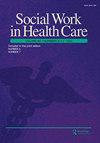特刊导言:新冠疫情时代的社会工作实践——挑战与创新。
IF 2.1
4区 社会学
Q1 SOCIAL WORK
Social Work in Health Care
Pub Date : 2021-01-01
Epub Date: 2021-02-16
DOI:10.1080/00981389.2021.1890381
引用次数: 4
摘要
本文章由计算机程序翻译,如有差异,请以英文原文为准。
Introduction to the special issue: Social work practice in the era of the COVID-19 pandemic - Challenges and innovations.
The emergence of the novel coronavirus (SARS-COV-2) in late 2019 is likely the largest global public health crisis of our lifetimes. COVID-19 morbidity and mortality rates in the United States are among the highest in the world, resulting in over 26.5 million infections and 450,000 deaths to date (Centers for Disease Control and Prevention, 2021). Compounded by a federal response by the Trump administration that can only be categorized as an abject failure, the US has concurrently experienced its worst economic downturn observed since the Great Depression (International Monetary Fund, 2020). Consistent with extant research on population health disparities, the pandemic continues to disproportionately affect communities of color (Centers for Disease Control and Prevention, 2021), highlighting entrenched health inequities in access to and quality of care driven primarily by the social determinants of health (SDOH). A recent study confirms the role of social factors in disease spread, with each 1 point-increase in Social Vulnerability Index scores at the county-level linked to 87 excess cases and 3 additional COVID-related deaths per 100,000 people across the US (Karmakar et al., 2021). Accompanied by skyrocketing rates of mental health conditions and substance misuse (Czeisler et al., 2020; Simon et al., 2020), disproportionate increases in deaths by suicide among Black Americans (Bray et al., 2021) and increased rates of drug overdose (Friedman et al., 2020; Glober et al., 2020), the pandemic has overwhelmed health systems and pushed the health workforce and the American public to the brink. As the primary social care workforce (National Academies of Science, Engineering and Medicine, 2019), the social work profession is central to both short pandemic response and longer-term pandemic recovery efforts. As a workforce focused primarily on addressing the social needs of those who are vulnerable and marginalized, social workers are responding through both direct service provision as well as macro efforts to ameliorate unprecedented disruption across health, social, and economic systems. Despite widespread confusion about
求助全文
通过发布文献求助,成功后即可免费获取论文全文。
去求助
来源期刊

Social Work in Health Care
SOCIAL WORK-
CiteScore
3.80
自引率
9.10%
发文量
25
期刊介绍:
Devoted to social work theory, practice, and administration in a wide variety of health care settings, this journal gives you the tools to improve your practice while keeping you up-to-date with the latest crucial information. Social Work in Health Care is edited by Gary Rosenberg, PhD, one of the most respected leaders in health social work. This creative, lively journal brings you the most important articles on research, leadership, clinical practice, management, education, collaborative relationships, social health policy, and ethical issues from the most respected experts in the field. The journal"s special issues comprehensively discuss a single pertinent health care theme.
 求助内容:
求助内容: 应助结果提醒方式:
应助结果提醒方式:


